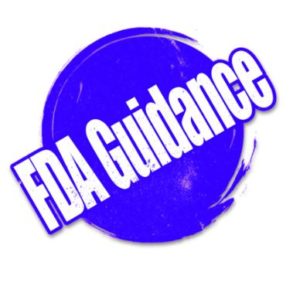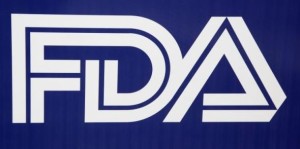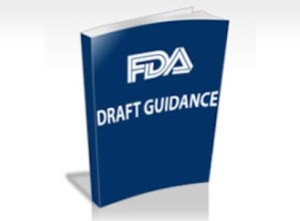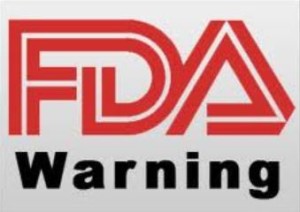- FDA Issues Guidance to Reduce Medication Errors (pharmacytimes.com) Safety Considerations for Product Design to Minimize Medication Errors (fda.gov)
A pair of FDA final guidance documents may help drug manufacturers reduce the risk of deadly medication errors...Both guidance documents are part of the FDA’s efforts to meet the goals of the 2007 Prescription Drug User Fee Act, which include establishing "measures to reduce medication errors related to look-alike and sound-alike proprietary names, unclear label abbreviations, acronyms, dose designations, and error-prone labeling and packaging designs."...In its first guidance document, the FDA recommended that submissions from applicants or sponsors include the following components to help the agency more thoroughly review the proprietary name appropriately:
- Primary or alternative proposed proprietary name
- Intended pronunciation of that name
- Derivation of the name
- Intended meaning of the name’s modifiers
- Pharmacologic/therapeutic category
- Proposed label and labeling, and what should be included when a product does not yet have a proposed label and labeling
- Information about product dispensing and delivery
- Substances Doubtful for Bulk Drug Substances List Could Be INDs (ashp.org)Individual Patient Expanded Access Applications: Form FDA 3926 (fda.gov)
Pharmacists, physicians, and advocacy groups that want patients to use substances unlikely to be on the upcoming "bulk drug substances list" for compounders should consider submitting "treatment" investigational new drug applications, FDA personnel recently suggested...FDA-cleared treatment IND applications...offer a legal workaround that can benefit many patients...a compounding pharmacy, could submit a treatment IND, which once that was in place could be expanded to treat a large number of patients...ASHP stated, absent "significant" revision, FDA's current expanded-access IND application process will not facilitate access to any drug available only from compounders...Jarow (Jonathan Jarow, from the Center for Drug Evaluation and Research)...acknowledged that submission of an IND application has seemed difficult to many individual healthcare providers seeking a drug for a single patient..."There's now a special form in development that has not been finalized—it's available in draft form—that caters to that specific type of IND rather than the general form that's used for all types of INDs, which looks very complicated," he said...Form FDA 3926, also known as "Individual Patient Expanded Access Investigational New Drug Application," went on display in February 2015 as part of a draft guidance for the pharmaceutical industry....
- Opioids: What is being done locally (kolotv.com)
America's love affair with prescription drugs began in the 90s when narcotic pain killers left the hospital and headed home in the form of a pill..."Pain killers began being prescribed at such a high rate, and the folks who were prescribing them didn't necessarily have any training," said Jennifer Delette-Snyder...of Join Together Northern Nevada..."Think of Heroin. An opioid in a pill is the synthetic form of that type of a drug,"..."A surge in painkiller prescribing has been the main driving force over this epidemic and of the heroin epidemic," said Dr. Tom Frieden, Director of the CDC...This week the agency started to combat the problem by issuing new guidelines (for) the prescriptions of opioids. The guidelines say opioids should not be the default solution for pain care..."People don't realize that these opioids are lethal. No one ever takes a pill thinking that it is going to kill them and this is the type of awareness that we are trying to build," said Teresa Benitez-Thompson, Nevada Assemblywoman from District 27...Doctors in Nevada now have to log opioid prescriptions in a database. The practice prevents patients from doctor shopping as well as prevents doctors from accidentally over prescribing...Delette-Snyder says both the CDC actions and the legislature actions have the potential to save lives, but she says we need to stay the course and only look to opioids for only the most extreme situations...Physicians could go back to prescribing only Ibuprofen, but only time will tell if they will. The CDC guidelines are only guidelines. They are not a mandate.
- Do Prescribing Doctors Act on Pharmacist Recommendations? (specialtypharmacytimes.com)
Among their list of responsibilities, pharmacists serve as an important member of an interdisciplinary care team to protect patient health and safety while minimizing costs...Existing literature shows that by communicating recommendations to prescribing doctors, pharmacists can help to measurably reduce costs, control chronic diseases like hypertension, diabetes, and hyperlipidemia, and improve patient outcomes...The prevalence of prescribing doctors acting upon pharmacist recommendations has been previously studied, with results ranging anywhere from 31% to 81%. Most assessments find that a pharmacist’s recommendation succeeds in modifying a doctor’s prescription about 50% of the time...Doctors are more likely to accept pharmacist recommendations intended to save costs (versus safety or guideline adherence), and they are more likely to accept recommendations to change or stop a medication (50%) than they are to start a new medication (41.7%)...
- GAO finds security flaws in Obamacare exchanges in California, Kentucky, Vermont (healthcareitnews.com)
Government Accountability Office discovered vulnerabilities in three states and said that other state-run health insurance exchanges may be at risk too...Obamacare health insurance websites in California, Kentucky and Vermont have serious cybersecurity flaws that could result in hackers obtaining personal data from hundreds of thousands of people...One state didn't encrypt passwords, GAO officials said. Another state didn't properly use a filter to block hostile attempts to the site. And the other state didn't use proper encryption - leaving a door for hackers to gain entry...Officials from both California and Kentucky told the AP there was no evidence hackers had stolen anything, while Vermont officials declined to comment on the findings...
- FDA proposes guidelines for generic abuse-deterrent opioids (statnews.com)General Principles for Evaluating the Abuse Deterrence of Generic Solid Oral Opioid Drug Products (fda.gov)
In the latest attempt to curb the spiraling opioid epidemic, generic companies will face new drug development requirements before they can sell copycat versions of abuse-deterrent opioids, according to a draft guidance released today by the Food and Drug Administration...the agency is recommending that generic drug makers run a variety of studies and provide data analyses to demonstrate that their medicines are no less abuse-deterrent than the brand-name products on which they base their own medications...We recognize that abuse-deterrent technology is still evolving and is only one piece of a much broader strategy to combat the problem of opioid abuse...encouraging generic alternatives can achieve that goal, especially since these are generally lower-cost alternatives to brand-name medicines...The draft guidance, however, won’t be finalized until after a 60-day comment period and the agency digests the reactions...The greater concern is whether the tamper resistance and abuse deterrence of the original formulation is sufficient. Many people abuse and misuse opioids orally, in which case tamper resistance will be essentially ineffective...
- EMA sets clear rules for drug firms seeking clinical data redactions (outsourcing-pharma.com)
Drugmakers seeking to stop "commercially confidential information" being made public in trial reports will need to demonstrate the likely economic harm publishing it would cause...The European Medicines Agency made the comments in guidelines designed to help marketing authorization holders comply with its policy on trial data dissemination...The document...details how drug firms should submit clinical reports, how they should make patient-level data anonymous and when they can ask for commercially confidential information to be redacted...Clinical trial data redaction is a controversial subject. The agency has faced both challenges from companies concerned sharing data would benefit rivals and criticism from European Ombudsman Emily O’Reilly about information it has allowed to be omitted to date...the guidance the EMA stresses that "the vast majority of the information contained in clinical reports is not considered CCI (commercially confidential information)." It also warned that drugmakers should not routinely make redaction requests every time the submit a study.
- FDA proposes biosimilar labeling that favors generic drug makers (statnews.com) Labeling for Biosimilar Products - Guidance for Industry (fda.gov)
In a closely watched move, the Food and Drug Administration...released draft guidelines for labeling that should appear on biosimilars...the directive is likely to give a lift to generic drug makers as they battle their brand-name rivals in this nascent but important market...The battle over labeling is significant because this information is used by physicians to determine which medicine — the original biologic or the newer biosimilar — to prescribe to patients...the FDA rejected the argument made by brand-name companies that clinical trial data used to prove a drug is a biosimilar should appear on the product labeling. Brand-name companies believe the data should be included in order to distinguish the medicines...Instead, the agency proposed using the same information found on the brand-name label along with a simple statement indicating the biosimilar is similar...The issue is "a debate with far-reaching implications,"..."The content of the biosimilar label was argued as critical" for how companies position their different medicines. But in its guidance...the FDA "struck a clear position" for labeling that resembles the requirements found on generic drugs...
- FDA announces enhanced warnings for immediate-release opioid pain medications related to risks of misuse, abuse, addiction, overdose and death (fda.gov)
New safety warnings also added to all prescription opioid medications to inform prescribers and patients of additional risks related to opioid use...Food and Drug Administration...announced required class-wide safety labeling changes for immediate-release opioid pain medications...the FDA is requiring a new boxed warning about the serious risks of misuse, abuse, addiction, overdose and death...actions are among a number of steps the agency recently outlined in a plan to reassess its approach to opioid medications. The plan is focused on policies aimed at reversing the epidemic, while still providing patients in pain access to effective relief.
- Telling docs they overprescribe addicting drugs doesn’t make them stop (reuters.com)
Government letters informing doctors they're prescribing vastly more addictive drugs than their peers fall on deaf ears...The doctors...were all writing far more prescriptions for drugs like opioid painkillers than doctors in similar specialties practicing nearby - but the letters didn't lead to changes in prescribing...I think if there is a way to make these letters effective it may be one tool in the arsenal to curb the high rate of opioid deaths...








